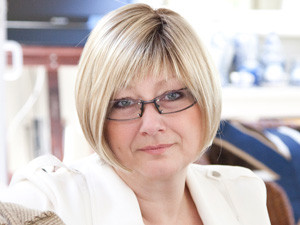
Angela Gahagan-Thomson is talking to me about the collapse of high street retailers as the trend towards digitisation sees more people shop online.
I imagine everyone sitting at home ordering groceries, socks or fridges via their smartphones, while shops board up, banks demolish their branches, and the only traffic on the road is delivery vans. I picture tumbleweed rolling through Sandton or dust storms howling down deserted Long Street.
Gahagan-Thomson laughs and tells me that's melodramatic. "I don't think it will stop people from shopping; it will just be a different experience. You'll be having coffee with your friends in a caf'e, showing them what you are about to buy via your smartphone and asking if they think it will suit you. I picture you going to a place with those new printers that are able to print clothes, so instead of getting your stuff delivered, it will be printed for you by the local Postnet."
Gahagan-Thomson was the MD of MTN Business until July, when the company 'reviewed its operating structures with a view to improving organisational effectiveness'. She was offered a sideways move to a different position, but chose to resign instead.
Her plan is to expand way beyond mobile technologies by offering advice and implementation services to companies unsure of how to navigate the digital world. "I had reached a point in my career where I could choose to be comfortable or courageous," she says. "If I truly believed in those future solutions, then this was the opportunity I needed to make them happen."
Her new company, Bongela Consulting, will call in skilled people she has worked with previously on an ad hoc basis to construct specific solutions for clients.
But what exactly will they do, I ask. "Digitisation is very difficult to explain to many people," she says. "It's about going from offline to online, so you are changing the traditional business model by using all the communications channels available."
Customers no longer pick up the Yellow Pages to look for a supplier. Today, they search on Google and make payments through Paypal or Amazon. Yet numerous businesses are unsure of how to wade into the digital world successfully. Financial institutions are very good at it, as well as some young entrepreneurial companies, she says, but few have a cohesive strategy for a focused approach to digitisation.
"There is an understanding by businesses that they need to do something, but they also know there is a lot to do and they don't know where to go first and how to bring it together. Do you do the apps first, or the marketing, or the payments first, or do you need to do it all at once?" Gahagan-Thomson asks, then answers her own question. "It depends on the business and what it needs."
Tactics include developing iPhone and Android apps linked to stock control and payment systems, so customers can check for goods and pay online.
"Imagine we were sitting here and - God forbid - we ran out of wine. I'd be able to get my iPad and use a GPS location service to find the nearest store that is still open, check it has the wine I want, check if it's chilled, pay for it and ask them to deliver it so we don't ruin the party."
Big data is another part of the equation, with companies collecting masses of data that can be analysed to produce customer-specific advertising or individually tailored incentives.
Social media
Businesses must also learn how to use social media better. A coffee shop, for example, can connect to coffee aficionados through a Facebook page and alert them to special offers or tasting sessions.
The younger generation is permanently connected through social media and they are the customers of the future, she says. "We have to understand their buying patterns and make sure we are catering for the way they do things. They become your word-of-mouth channels on Twitter and Facebook. Even in the traditional market, the best advertisement is word of mouth and you're multiplying that 10 000 times on social networks like Facebook."
I had reached a point in my career where I could choose to be comfortable or courageous.
Having children has helped her keep up with digital developments, and her daughter Shannon is already a serial entrepreneur, currently selling advertising on Facebook. Shannon will handle online marketing for Bongela's clients. But it's Gahagan-Thomson's own curiosity that sparked the dream to create a business of her own.
"I love being curious, so when I see something I don't know, I'll Google it and read articles about it so my knowledge is expanded by feeding my curiosity. I'll use my BlackBerry in a shop to look up something or send a photo to my son and ask whether we are looking for one of these. He'll say, 'Perfect, buy it!'"
Thinking that most South Africans are not yet ready for this digital world is a head-in-the-sand approach, because, as she knows from her years with MTN, the bulk of cellphones now being sold are smartphones. Businesses should prepare for online interactions now, rather than scramble later to catch up with the demands of their - potentially former - customers.
The result will be a huge percentage increase on their revenue, she promises, from increased sales and the cost-efficiencies of trading online.
That's a bold promise and comes with the threat of some potential disruption to your business. But disruption is better than disappearing, as those high street retailers can tell you.
First published in the December/January 2013 issue of ITWeb Brainstorm magazine.
* Article first published on brainstorm.itweb.co.za
Share